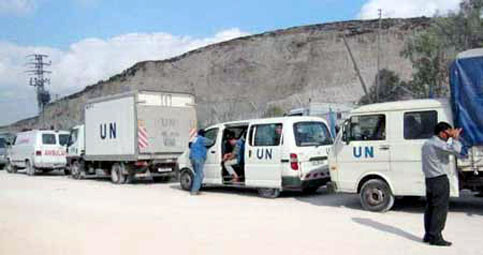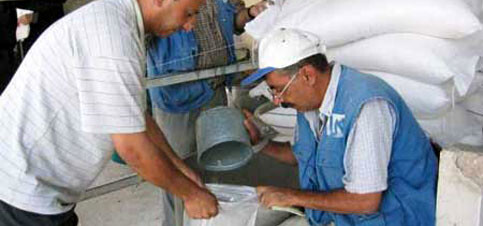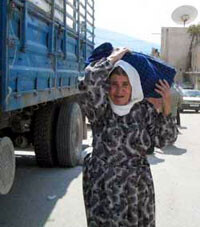
Waiting at Beit Iba checkpoint (Photo: UNRWA, 2003)
It’s ten o’clock in the morning. The 10 members of the UNRWA distribution team watch Ahmed as he slowly walks the 100 metres that separate him from the armed soldier. A few moments later all can they see is the back of a blue UN vest confronting a green uniform. The men do not speak. They have been waiting at the Beit Iba checkpoint, five kilometres north-west of Nablus, for more than two hours, and still have a long way to go before they reach their destination. The queue is long and nothing is moving. In Faraa Camp to the northeast, hundreds of people, many of whom depend on UNRWA food distributions, are waiting for the men to arrive with their fully-loaded trucks of rations.
Five tense and silent minutes pass before Ahmed walks back towards them with a smile. ‘Get the trucks, we’re crossing,’ he says victoriously; his negotiations with the soldier appear to have succeeded. Discreet sighs of relief greet his announcement. The journey is not over and nothing is ever taken for granted at Israeli military checkpoints. Hajj Bassem, the distribution team leader, quickly reorganises his men. The trucks will go first, followed by the van transporting the distribution workers. It will still be some time before the whole convoy crosses the checkpoint, at 1040 hours.
Nearly three hours have been wasted at Beit Iba checkpoint. The workers, who have been standing next to their trucks, are covered with dust swirling from nearby stone quarries. An hour from now they’ll be covered from head to toe with flour dust.
Although the day has had a slow start, it does not seem to bother the 11 members of the Nablus distribution team. Many of them have been working together for years, and they form a tight and cohesive group, where tasks are evenly divided and routines have developed over the course of many long, repetitive days of food distribution.

UNRWA aid worker distributes suger to Palestinians in need (Photo: UNRWA, 2003)
The distribution team work five days a week; their days start at dawn and often end after dark. The trucks (one to three, depending on the quantity of parcels distributed) are ready by 0715 hours, at the Balata (Nablus) UNRWA warehouse. The distribution lists are collected from the Nablus Area Office by 0730 hours, and the convoy can be at one of the checkpoints leading out of Nablus at 0745 hours. The rest depends on the security and military situation that day, a little bit of luck, and the determination of the distribution team.
Less than two kilometres north of Beit Iba, Sheve Shomron checkpoint awaits. The convoy carefully advances towards the armoured Israeli army tower. Sheve Shomron is a notoriously difficult checkpoint, where many UNRWA staff members routinely wait for hours. Last year, the distribution team had to overnight in a neighbouring village, Silat Dahr, because the soldiers declared the checkpoint closed for the day. To the team’s surprise, today the van and trucks are through in a couple of minutes. This might compensate for the time lost at Beit Iba, and the convoy speeds towards Faraa Camp. Before the intifada, the once 15-kilometre trip from Nablus to Faraa was an easy chore. Twenty-five minutes and a pleasant drive through the green, waterfall-bordered Bidan valley separated the two towns. Today it takes twice that distance and time, excluding the delays at checkpoints.
The convoy bumps along the cracked roads and arrives at Faraa Camp at 1120 hours. The distribution centre, in the middle of the camp, is packed with people who have been waiting since early morning. Despite the wait, the team is welcomed with smiles and cheers. Camp residents know that the delay was caused by the ‘situation,’ as they laconically call the three year-old intifada and its array of devastating economic and social consequences.
It’s nearly noon, and the distribution team has no time to waste. Their own lunch will come later. Mazen, who is in charge of the distribution coupons, sits at a large table. Refugees must present these coupons to collect their goods. In the blink of an eye, Mazen is surrounded by hurried refugees requesting their vouchers.
The distribution is ready to begin. Each worker takes a corner of the distribution centre, always the same corner, with ‘his’ commodity: Mohammed has been offloading sacks of flour for 30 years; Nafez weighing and distributing sugar for eight years, and Samir emptying thousands of sacks of rice for five years. Hajj Bassem has supervised his team with a sharp eye for more than 20 years.
The distribution team know most of the refugees by name. Despite the rush to get there, fatigue and physical effort, they never fail to ask about a member of the family who is sick, the wedding of a daughter or son, and the school results of the children.
A pillar of UNRWA’s Special Hardship Case (SHC) programme, food distributions have become part of the landscape and refugee life. With minor variations, for decades these food distributions have consisted of 30 kilograms of flour, three kilograms of sugar, three kilograms of rice, three litres of oil and two kilograms of powdered milk, in addition to NIS 50 per person. The names of registered refugees who qualify for this additional help from UNRWA are carefully screened by UNRWA social workers. Operating in teams in the camps, social workers visit applicants in their own houses to determine eligibility. Rules are strict, and all criteria have to be met. Women whose husbands have died or whose husbands have divorced or abandoned them, the elderly, the chronically ill, refugees with disabilities or the very young are all among the categories that can enroll in the SHC programme.
Unlike the emergency food distributions initiated by UNRWA in response to the declining economic conditions during the intifada, the SHC assistance is part of UNRWA’s regular programmes and is paid from the General Fund, not the emergency appeals. Only 5.7 per cent of all refugees qualify for this safety-net assistance.
In Faraa Camp at midday, the sun hits hard. The distribution workers start taking short breaks in pairs; work continues without interruption while each two slip away for a well-deserved falafel sandwich.
The distribution centre has become a hive of activity, as people move from one corner to the other to collect their bags of food. Meanwhile, they greet each other and socialise until their names are called by the distribution workers. Conversations then end abruptly as they head for the sugar, milk, oil or rice corners.

An elderly hajjeh carries her bag on her shoulders as she slowly walks up the hill leading to her house (Photo: UNRWA, 2003)
The UNRWA social worker bustles among the refugees. A social worker always attends the food distributions, in case there are problems with the lists or SHC refugees cannot collect their allocations. Last night, she says, an elderly lady broke her leg. The social worker delivered her food and money and rushed back to the distribution centre.
At 1300 hours, most parcels have been distributed. Little is left in the trucks and the distribution centre starts to empty. Grains of rice are scattered on the ground and flour dust has whitened all surfaces. The last SHC refugees collect their belongings and pack them into the remaining carts. Abed (below) rests his back for a few minutes.
In one month, the Nablus distribution team delivers an average of 11,000 parcels, amounting to 408 tonnes of food. Although most distributions take place in the eight Nablus area refugee camps, dozens of villages are included as well. The Nablus team covers the largest West Bank area, stretching from Zaatara to Jenin.
It is 1330 hours, and the distribution workers are now ready to leave. No time for a break because the journey back home might be lengthy. The trucks and the white van leave Faraa camp and arrive at Sheve Shomron checkpoint at 1400 hours. Although there is no apparent problem, the team waits for 40 minutes before being allowed through. Ambulances have precedence over UN cars, and many overtake the convoy. The distribution team patiently waits for the soldiers to check the ambulances, and finally cross the checkpoint at 1440.
For the first time today, the team’s faces seem tense as they approach Beit Iba checkpoint at 1450. In a glance, they understand it will not be easy to go through. More than 20 trucks are waiting in the queue. Their engines are off, a sign they know well: long delay ahead. On the other side of the checkpoint, vehicles, ambulances and trucks are meticulously checked by the soldiers. Ahmed, the team’s ‘chief negotiator,’ as they call him, approaches one of the soldiers in an attempt to negotiate a faster passage of the UNRWA convoy. But this afternoon, the soldiers are not well disposed towards UN blue vests. In an angry and quick move, the soldier chambers a round in his rifle and yells ‘go back!’ Ahmed knows when to retreat. This is no time for deliberations. A brief discussion among the distribution workers follows. As usual, the final decision is left to Hajj Bassem. The team will try to reach Nablus through Huwwara checkpoint. This means a detour of 22 additional kilometres, but the team members want to get home before dark.
One of the trucks will have to stay at Beit Iba: while the team was waiting, other trucks arrived and it is impossible for him to move. The driver does not complain, and wishes his colleagues a good evening. The van leaves Beit Iba at 1505, and reaches Huwwara, south of Nablus, half an hour later. The roads are nearly empty and settlers’ cars whiz past. The distribution team is luckier at Huwwara. The UN van makes it into Nablus at 1545, ending another day of checkpoints, delays, and lifting of UNRWA food sacks. The truck driver stuck at Beit Iba is not so fortunate. He reaches the UNRWA Balata warehouse at 1730 hours. As he parks the truck in the compound, shooting starts in the camp. He has to wait for an additional 15 minutes before hastily sneaking out in the dark, on foot. There was no one to take him home.
It has been a normal intifada day for the Nablus distribution team. The van has waited at four checkpoints a total of three hours and 45 minutes; the truck that stayed at Beit Iba, five hours. Three-hundred-fifty food parcels have been distributed, and the distribution workers have offloaded a total of 13 tonnes of food. Next day, 450 parcels are to be distributed in Nur Shams Camp, in Tulkarm. That is four more checkpoints to cross, an unknown number of hours to wait, and 17 tonnes of food to offload. But tomorrow is another day.

